

In this issue
Sanctuary scholars



Sanctuary scholars
Understanding migration
Gaza visa call
Refugee reflections
Alparsalan’s story
Safe routes
Bell Farm Centre
Accommodation matters
Joseph’s story
Volunteer profile
Is Rwanda safe
Sport
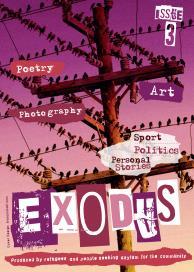
P3
P4
P5
P6
P7
P8-9
P10
P12-13
P14
P15
P19
P20
Exodus is a non-profit magazine produced by a small group of volunteers to give a voice to refugees seeking a new life in the UK. Exodus team: Jean-Marc Hall, Souran Soleimani, Martin Trepte, Helen Ball. Contact: exodusfanzine@gmail.com
MIGRATION over recent centuries has helped shape our society in Britain today.
It has influenced Britain’s economy, politics, culture and relationship with the wider world.
As Britain expanded its foothold in India and the Caribbean and began trading in enslaved Africans, increasing numbers of people arrived here to find work and a better life.
The Industrial Revolution and the growth of the factory system bought mass migration of people seeking work.
Added to that, there were refugees and political exiles fleeing racially motivated violence.
The UK’s membership of the European Union meant that anyone in the EU had the right to work in any of the member countries.
In the early 2000’s Britain’s economy was booming. This was partly thanks to migrant workers, who contributed to growth and development.
When immigrants enter the work
force, they increase the productive capacity of the economy and raise GDP.
Migration leads to the intermixing of people from diverse cultures, and it has a positive contribution such as the evolution of composite culture.
With improved learning and increased tolerance and opportunities to come together with others, culture enhances our quality of life and wellbeing.
Exodus is a voice for refugees and asylum seekers, sharing their personal stories and expressing their views on their life experiences.
Its narrative is to inform communities and help integrate those seeking sanctuary. Britain’s history is rich in diverse culture and traditions and Exodus points the way to a free, safe and optimistic world.
Welcome to issue 4, where you’ll find a great mix of articles covering personal reflections and reports on the vital work of charities and important topical issues.
Jean-Marc Hall Exodus Project Co-ordinator
IF YOU have ever had the opportunity to visit different countries and experience different cultures, or even just spent time with people from different communities here in the UK, you will have quickly realised a simple truth: people are people.
Wherever you go you will find mums and dads love their kids; people just getting by and trying to make the best of things; families living, loving, laughing and crying together in the face of triumphs and troubles in a turbulent world, often exacerbated by external factors far beyond their control.
In short, wherever you go and whoever you meet, people are just like us.
The Exodus Like Us Project aims to highlight this common humanity to counter the toxic narrative and ‘othering’ of refugees and people seeking asylum that paints them as somehow alien and threatening to ‘us’ and ‘our’ way of life.
By telling the stories of those seeking sanctuary we aim to show that there is much more that binds us together than sets us apart. Cultural differences are enriching and should be celebrated - and if you just take the time to look, you’ll see there are no ‘others’.
Everyone is just like us.
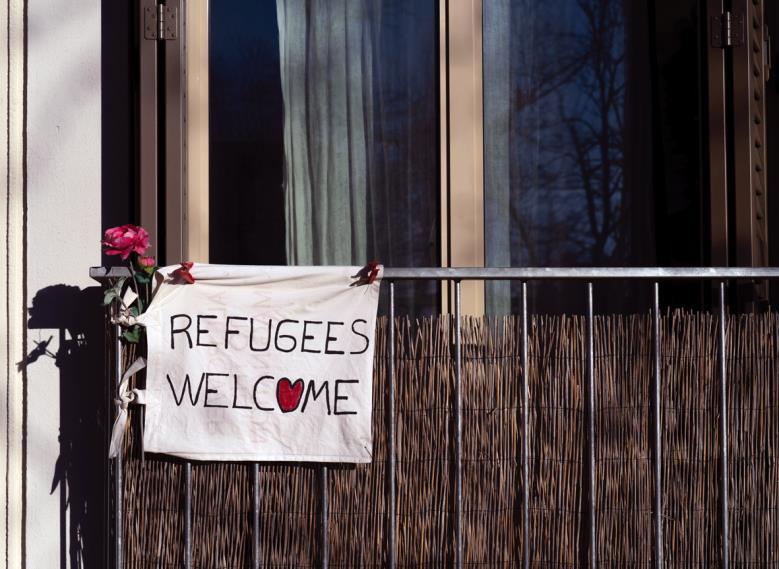
Exodus wants to hear stories from refugees about your reasons for seeking sanctuary, your life before your journey to the UK and your hopes and dreams now you are here.
We also want to hear stories about how refugees have been welcomed by the
communities in which they live and how people of different cultures coming together improves and enriches the lives of everyone.
Telling these stories now is more important than ever. Please send your stories to exodusfanzine@gmail.com

FIRST thing on a Monday morning earlier this year, some of the Exodus Team had the pleasure of meeting two sanctuary scholarship students from Warwick University who have been named on The Big Issue’s 100 Changemakers of 2024 List.
The list celebrates the people and organisations who are creating positive change and serves as a tribute to people who have focused not on themselves, but on the community.
Warwick’s Sam Pordale, 23, and Angel Nakhle, 20, have been recognised for their work on the national campaign ‘lift the ban’ which advocates for asylum seekers to be given the right to work, and their service as youth advocates for Refugee Education UK. They also volunteer with Student Action for Refugees (STAR) and are members of the Mentor Programme that helps asylum seekers with their university applications.
Sam is in his first year studying Politics and International Studies. He came to the UK in 2022 as an asylum seeker from Afghanistan and was given a sanctuary scholarship from the university to start his course in September 2023.
Sam is a member of an English teaching programme at STAR that helped him when he first came to the UK. He now volunteers at migrant centres and provides emotional support, alongside Maths and English tutoring.
Sam said: “For asylum seekers, getting into university is really hard. I want to change that and help education be more accessible. Seeing two refugees as part of this list shows that if we’re given the same opportunities we can make a difference and change the narrative of how we are perceived.”
Angel was 12 years old when she and her family came to the UK from Lebanon and is currently in her second year studying Law with French Law. She got involved with the charity Stories of Hope and Home before coming to Warwick, and then started to help with Refuge Education UK and STAR in her first year, helping asylum seekers get into higher education.
Angel said: “The groups that I work with have given me a platform to use my voice and feel heard and I want to motivate
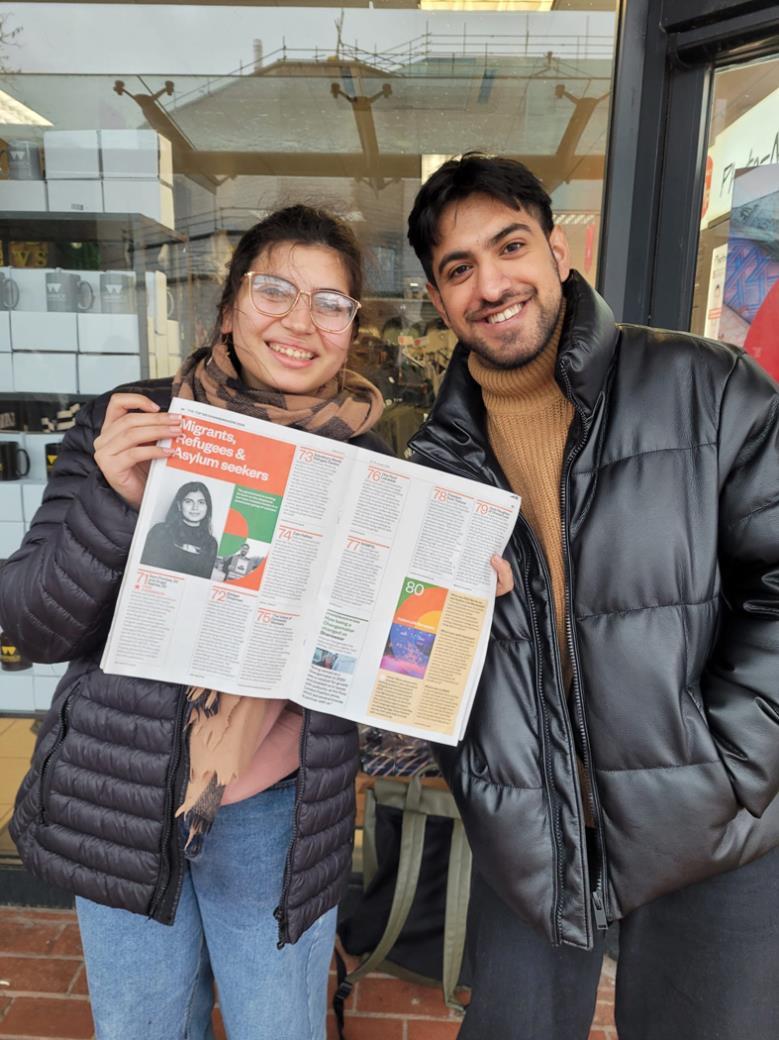
more people to come forward and be advocates to make a difference. I never thought that the work I do for my community would ever get this recognition, but it shows that these small steps and getting involved do matter.”
Angel said she feels there is a disconnect between the preconceived assumptions promoted by some parts of the media and the current government; her personal experience is that ‘everyone has been so welcoming’.
Sam said he was ‘not expecting people to be so nice’. As ‘most people haven’t met an asylum seeker’ and some don’t see them ‘as humans’, Angel said they are very
keen to share their story to give ‘inspiration, show the way and allow others to feel hope’.
The Exodus team were so impressed by Sam and Angel. Both are ambitious for their futures, citing hopes and dreams where they use their higher education to give back to communities and support others to access opportunities.
We all commented that it was a fantastic way to start the week, to hear from these inspirational people who are and will give so much to the world.
We are fortunate to have them in our country.

MIGRATION, a global phenomenon affecting millions of individuals, has become an increasingly complex and compelling issue in recent years.
According to the United Nations High Commissioner for Refugees (UNHCR), approximately 281 million people, which accounts for roughly 3.6 per cent of the world’s population, currently reside outside their country of origin.
Many of these migrants embark on their journeys due to a combination of factors, often driven by circumstances beyond their control.
Forced migration has become a distressing reality for a growing number of individuals. These migrants face numerous human rights violations, including denial of civil and political rights through such things as arbitrary detention, torture, and lack of due process.
Additionally, they may experience infringements upon their economic, social, and cultural rights, such as limited access to healthcare, adequate housing, or education.
In the United Kingdom, the number of asylum applications has surged significantly in recent years.
According to the UK’s Home Office, there were 78,768 asylum applications in the year ending June 2023, marking a 19
per cent increase compared to the previous year.
This figure surpasses the number of applications during the European migration crisis in 2016 and represents the highest number in two decades.
During my time at the Bell Farm Christian Centre, as a fellow migrant, I had the privilege of meeting individuals who were awaiting decisions on their asylum requests or undergoing processing in the UK.
Among them were individuals fleeing war, persecution, and violence, arriving with nothing more than the clothes on their backs.
These migrants encompassed a diverse range of backgrounds, such as professionals, non-professionals, mothers with children, and elderly individuals who should be enjoying their retirement.
They had different reasons for seeking asylum, including political persecution, marginalisation, and issues related to their sexuality, among others.
These migrants, hailing from various countries, possess real-life experiences that bear witness to their resilience and
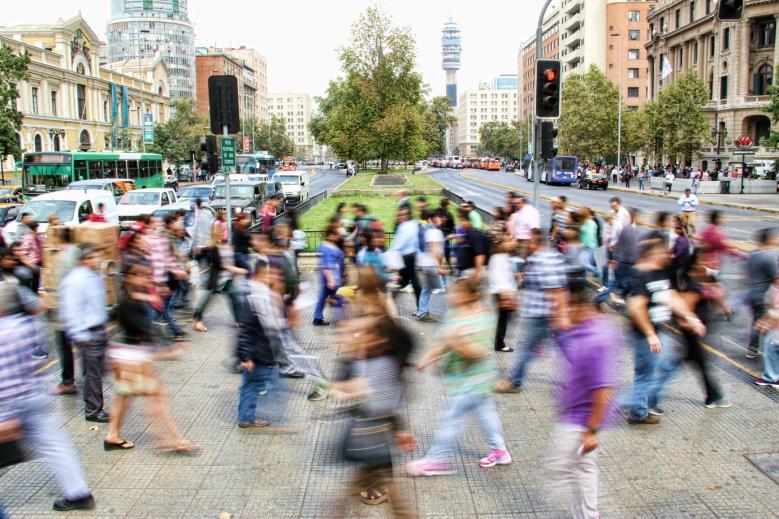
potential contributions to the UK’s economy. One individual I encountered was Umar, a 27-year-old Syrian asylum seeker volunteering at the Bell Farm Christian Centre, which is located in the heart of West Drayton, Middlesex.
Standing at an impressive six feet and 1.23 inches, Umar had a captivating presence. He possessed a golden voice and a friendly demeanour. Umar's journey to the UK began through legal means, as he secured a job opportunity in a restaurant sponsored by the owner.
However, Umar's story took a grim turn upon his arrival. He was subjected to modern slavery when his employer refused to pay his salary and coerced him into working long hours without compensation.
He found himself sharing a shelter with five other individuals facing similar circumstances. Umar's case is currently under investigation, highlighting the prevalence of such exploitative practices.
The immense stress and mental instability resulting from his ordeal caused Umar to develop unhealthy coping mechanisms, such as smoking 25 to 30 cigarettes a day.
Seeking medical assistance, he started receiving treatment and witnessed a significant reduction in his cigarette consumption. He was also prescribed a medicine to further aid him in his efforts to quit smoking altogether.
Volunteering at the Bell Farm has proven to be instrumental in Umar's healing process.
He shared that it not only provides him with a valuable way to spend his time but also broadens his perspective on humanity as a whole.
Umar believes that each migrant and refugee bears a unique story, and by listening to them, he can help them find solutions to their problems, connect them with charitable support, and contribute to their healing processes.
In turn, this work has facilitated Umar's own integration and paved the way for a brighter future.
Umar's story is just one among many. The experiences of those seeking sanctuary shed light on their resilience, determination, and unwavering hope in the face of adversity.

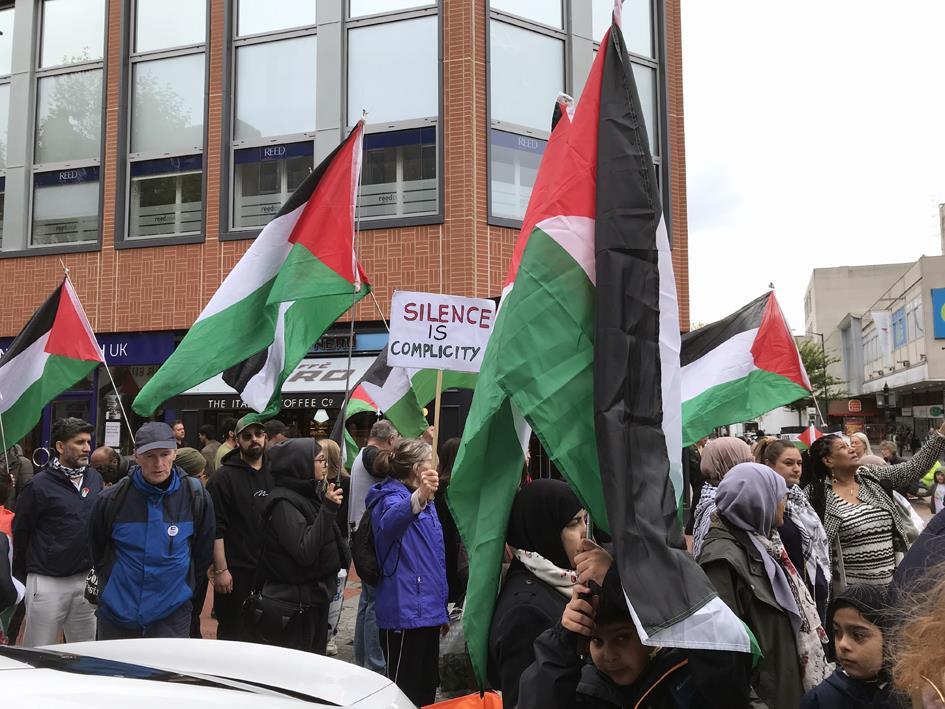
Campaigners call for an immediate ceasefire in Gaza at a weekly protest in Reading.
A CAMPAIGN group has co-ordinated a letter to Parliament calling for an urgent visa scheme for Palestinians from Gaza to be reunited with loved ones in the UK, just like the Government did for Ukraine.
The letter, organised by Gaza Families United, has been signed by more than 60 organisations and law firms working in the migrants’, children’s and human rights sector including the Refugee Council, Refugee Action and Care4Calais.
It calls on the Home Secretary to introduce a Gaza Family Scheme to allow family members of Palestinians in the UK to be reunited with their loved ones and offered temporary sanctuary until it is safe to return.
The letter, which was sent in April, before the Israeli ground offensive on Rafah began, said that with each passing hour the situation in Gaza continued to deteriorate due to bombardment and lack of access to food and medication.
It said that existing immigration routes were insufficient and not working as eligible Palestinians had to register their biometrics at a visa application centre in Egypt.
‘Palestinians in Gaza seeking to reunite with family in the UK are trapped in a Catch-22’
The letter read: “Unlike in the case of British nationals, the British Government is not facilitating safe passage for Palestinians in Gaza seeking to reunite with family members in the UK.
“Palestinians in Gaza are thus trapped in a catch-22: the British Government is demanding they register biometrics but is
denying them a viable way of doing so.”
It said families were being forced to set up crowdfunders to raise the tens of thousands of pounds needed to arrange evacuation to Egypt by private company.
Writing on X, formerly Twitter, Gaza Families Reunited said: “Palestinian families in the UK have called for a Gaza Family Scheme alongside a permanent and immediate ceasefire.
“A Gaza family scheme is long overdue to protect human life and the right to family unity until it is safe for Palestinians to return.”
Nearly 104,000 members of the British public had also signed a petition calling for the urgent introduction of the scheme, which meets the threshold for it to be considered for Parliamentary debate.
However, the calling of a general election on July 4 means Parliament has to be dissolved and parliamentary business, including petitions, will stop.

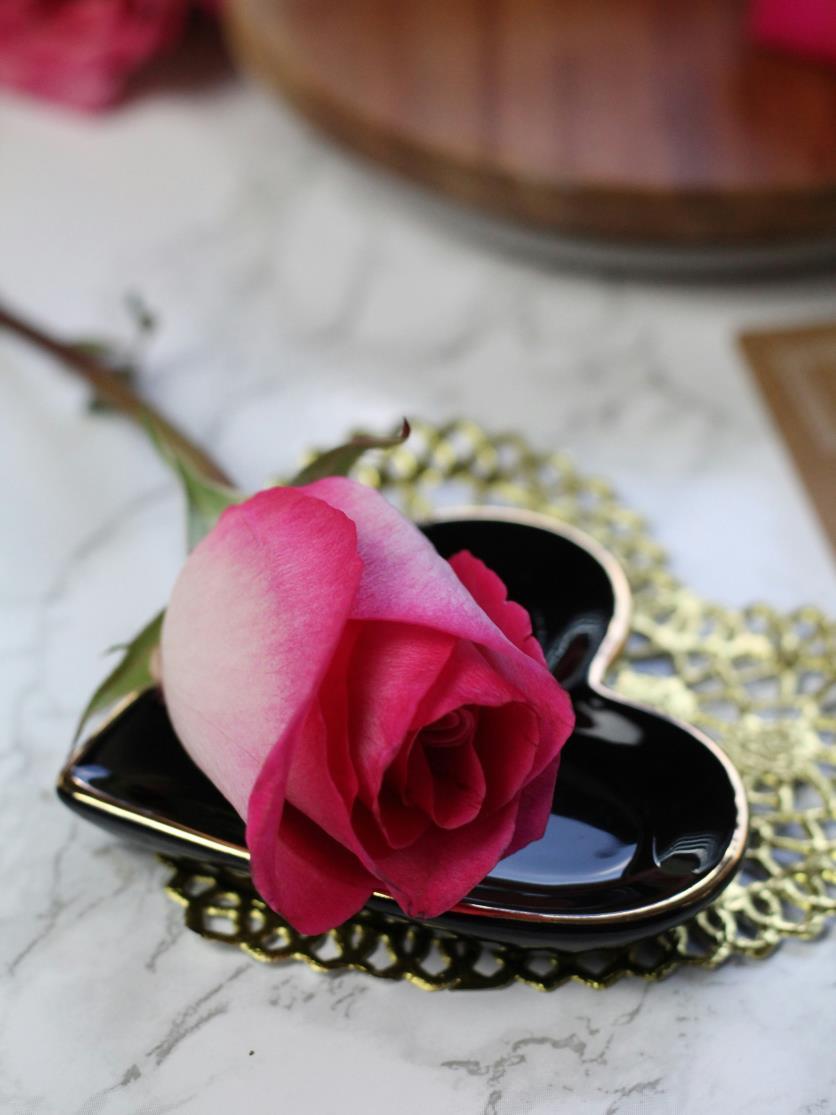
VALENTINE’S Day has again taken on the colour of love for me.
It was precisely on Valentine's Day in 2014 that a new upheaval began in my life, I always thought that this day would never be beautiful again since then,.
As a woman, I worked in the field of women’s rights in Iran for 10 years. When I started my career as a doctor, I felt the pain of the women of my country with all my heart and every moment I understood more than the day before that this wound cannot be treated with medicine.
Before the Islamic revolution, the women of my country had a glorious life with freedom and equality!
Is it possible to make someone who is literate and learned, illiterate? Is it possible to call someone who has tasted the colour of freedom, a slave? These women are deprived of their rights every day worse than the previous day! If Iran did not have supportive men,
the suicide rate of women in the country would have exceeded the current number.
For years, I always tried to make the men and women of my country aware of human rights. I sent articles to the International Human Rights website, and finally we were able to condemn the Iranian government for these anti-human acts and laws at the international level.
My friends and I, several of whom were sentenced to death, did not stop any activity for women, life and freedom.
After living in England for a long time, it was Valentine's Day when I suddenly got excited. The Home Office has allowed me to live safely again in England.
After a decade of loathing Valentine’s Day, this day has become a beautiful day again. And again my heart realised there are still people who support ending human slavery. Woman, life, freedom.
KynzTHE Other Side of Hope: Journeys in Refugee and Immigrant Literature, is a project that aims to give a home for the migrant writers and poets of the world.
A UK-based literary magazine edited by immigrants and refugees that was set up in 2021, it is the country’s first literary magazine of Sanctuary, accredited by City of Sanctuary UK.
The project is made possible thanks to public funding from the National Lottery through Arts Council England.
It was created for those who play against all odds, those unsure of every word they write, the frowned upon ones and mostly unwelcomed, the beautiful strangers.
It’s a project of understanding, a tiny mirror that reflects those who keep on trying, those who write without hope in the badly lit corners of literature. It’s a project of words that maybe someday will clean a little the great big mirror of life from the slime they throw at our reflections, so that the cruel may be less cruel and the kind kinder. It publishes unthemed poetry and fiction by refugees and immigrants only, and non-fiction, book reviews and author interviews by everyone on the theme of migration. All contributors are paid and the publication also collaborates with the AM Heath Literary Agency, which each year chooses six contributors to offer free one-to-one sessions.
It aims to publish biannually, one issue in English, and one in other languages alongside English translations.
Print issues are available to buy through its website and online editions are accessible for free, see: https://other sideofhope.com/index.html
To contact the editors, please email editor.otherside @gmail.com

“MEETING Alparsalan reinforced my view that someone like him just needs one good opportunity and they will seize it and succeed.”
So said Platform Housing Group’s job coach James Ward as he worked with Afghan Alparsalan in his quest to build a new life and find work in the UK.
“He was feeling despondent at the start as he had been trying really hard to find employment. During our work he came to accept he needed to broaden his job search to include more possible careers. This helped him to stay motivated. When I introduced Platform Housing Group as an option he was very keen, being a Platform customer and needing a job that ideally involved hybrid working as he has young children.”
Rewind to 2021 and 3,600 miles away; Alparsalan is living in the capital Kabul in Afghanistan with his wife and two young children; the Taliban’s summer offensive is raging, resulting in the evacuation of tens of thousands of civilians and military personnel, the capture of 33 out of the 34 provincial capitals and heavy loss of life. Alparsalan is working for the British military in a variety of roles from translator to linguistic supervisor to training the Afghan security forces. As part of his role as cultural advisor, he works closely with British military specialists in HR, logistics, finance and communications. His special focus is on gender equality and empowering women within the Afghan security forces.
Alparsalan had a happy upbringing; his father was a colonel in the Afghan army and the family moved around finally settling in Kabul. He studied International Relations at the city’s university and married his wife in 2013.
Alparsalan explained: “On 17 August, 2021 – two days after Afghanistan fell into the Taliban’s control – I was evacuated with my family and my younger brother to the UK. As part of the British government’s resettlement programme for Afghans –ARAP – I was introduced to Worcestershire County Council to re-home me; as a result I secured a home in the Wychavon district.” He recalls his last few days in his home country with sadness. With the collapse of Kabul, both UK and coalition forces were stationed at the airport, where Alparsalan’s job was based. Frightened of retribution from the Taliban, he packed up his office and continued to work from home compiling a list of people in immedi-
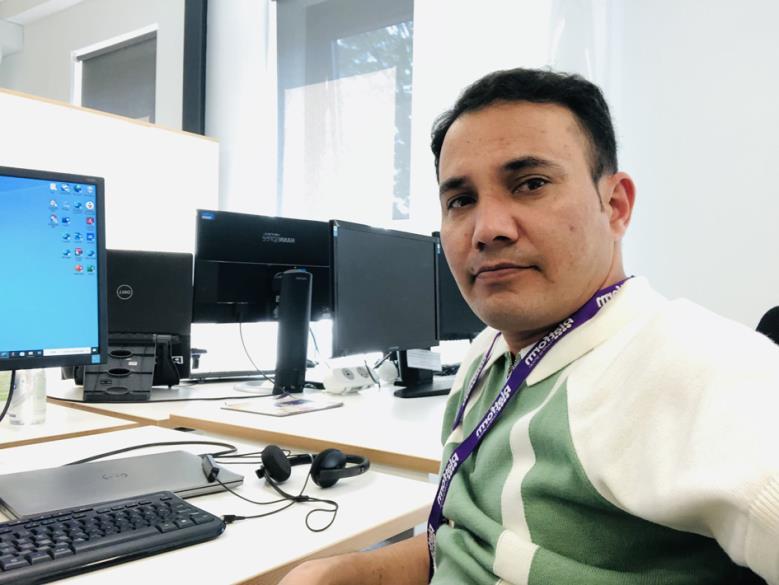
ate danger and in need of being evacuated. In a twist of fate, Alparsalan was also identified by the British Army as one of those who would need to be evacuated.
Natasha White, operations manager in the resettlement team at Worcestershire County Council, said: “At the first engagement appointment, it was clear to the job coach that Alparsalan was very conscientious and determined to find employment or undertake training. He had been in earnest in his job search since he arrived in the UK.”
The resettlement team focuses on a variety of roles including finding homes, helping to settle families into their communities, helping them to understand what it is like to live in the UK, assisting them with accessing medical support, ensuring their children are enrolled in school, helping with converting qualifications into those ones recognised in the UK and supporting them to find meaningful employment or education, to suit their aspirations.
The primary goals set for Alparsalan were to find employment in an administrative or customer service role. To improve his chances of securing work, relevant training courses were researched and help provided with his CV. He also completed his Cambridge English Advanced course. His job coach mentioned that Platform Housing Group often recruited for admin jobs and suggested he apply for one that had just been posted.
A few weeks later, Alparsalan was invited to an interview for an Apprentice and Qualifications Administrator vacancy; he
was successful with the first interview and invited along to a second. It was such a boost to his confidence when he was offered the job on the same day as the interview.
Job Coach James said: “Alparsalan was very easy to coach; motivated, open to advice and proactive, he is a thoughtful and intelligent person with professional experience that some of us will never achieve. He has so much to offer. When he told me he had been selected for interview I was absolutely thrilled for him.”
And things just got better for Alparsalan. When his temporary contract finished he was offered a permanent role as a Strategic Assets Management Assistant.
Alparsalan said: “My career aspirations are centered around constant growth and enhancing my skills. I really am passionate about creating a positive impact. I feel very proud to be able to contribute to Platform’s journey. As an immigrant I had to leave family and friends behind but my colleagues have embraced me and now I have a very wide group of friends within the company. It’s a very friendly and diverse place and I feel very welcomed.”
And the final word from Alparsalan? “Although my family is settled here and I have been so welcomed, accepted and supported, I would love to return to my homeland in the future if things change. My parents and one brother are still there and – with other siblings in Canada and Belgium – I have a longing for the most important unit, family.”
Kabbie Langford

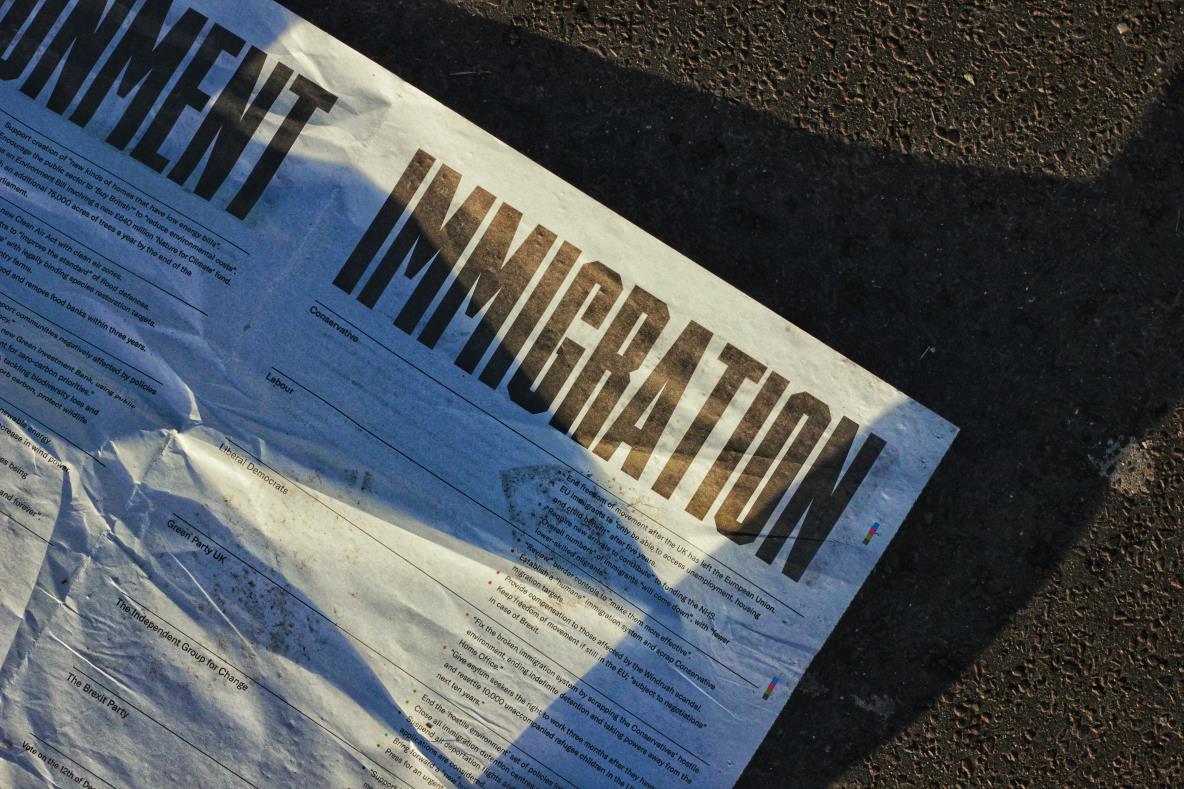
WITH the general election set for July 4 and a possible new government, the plan to send asylum seekers to Rwanda may well be dead in the water.
When the political parties send their candidates knocking on your door, what are you going to be asking?
Among the arguments and questions that will be discussed, the future of the NHS will probably lead, with the cost-ofliving crisis closely behind.
Immigration has been worked up into a big topic a political football that needs serious answers. But no one party has a direct and workable plan.
Even the Conservatives admit among themselves that the Rwanda plan has not only been a waste of taxpayers’ money but is wholly unworkable.
Humanitarian groups have been united in voicing that safe routes are the only way
forward to stop small boat crossings from France.
The ‘safe route’ plan effectively operates in a similar way to the Ukrainian visa schemes, but unlike those schemes, on arrival in the UK people seeking asylum would enter the normal asylum process.
It is proposed that asylum seekers would apply for a visa online, avoiding any need to be processed in France before they travel to the UK.
Once granted, they would arrive via a safe route and eliminate the dangers of crossing the channel by small boats.
Currently, approximately 90 per cent of all people seeking asylum have their claims accepted, so it makes sense that arriving via safe routes is the best solution.
Those who fail in their claims would not be allowed to remain in the UK.
It has been proved, that ‘safe passage’
works. No Ukrainians have entered the UK via small boats or used people smugglers to cross the channel.
The Conservative government’s Illegal Migration Bill risks violations of human rights and has been comprehensively condemned by humanitarian groups that include trade unions and church leaders.
As a reader of Exodus, remember to ask your political candidate what their party will be advocating as a solution to immigration.
Remember that historically, immigration has been with us for centuries and helped us build a society rich in cultures and productivity.
The impediment of people fleeing conflict, oppression and climate change is disparaging and vilifying and we must unite to do all in our power to make a change.
Jean-Marc

FOR A refugee charity’s senior operations manager in Calais, a vigil earlier this year for five young Syrians who drowned at Wimereaux trying to cross the Channel is a stark example of how providing safe routes is the only way to stop such tragedies.
Imogen Hardman, from Care4Calais, said at the vigil she met the brother of one the people who was lost.
“He was shocked and numb, disbelieving that the journey they made together had ended like this, in horror just 20 miles from their destination. He is in his twenties, now left alone in Calais – the rest of his family are still in Syria. His brother was 14 years old.
“In the biting cold and dark, you could feel how the tragedy,
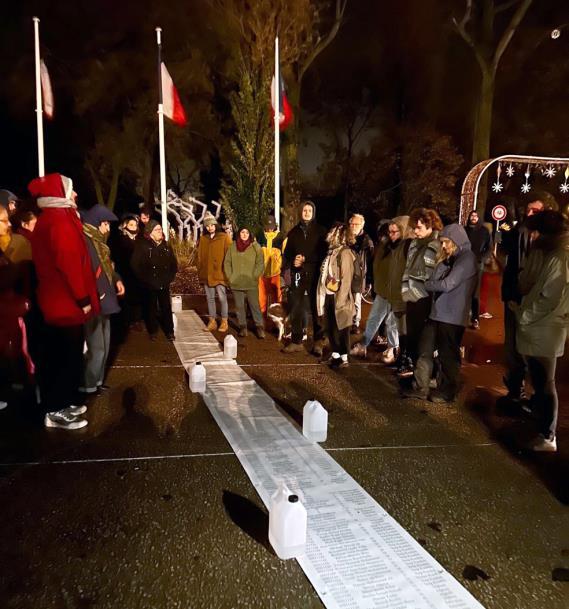
take greater risks, and suffer worse attacks. Hardly surprising, then, that the death and injury counts rise.
“The UK and French authorities sanitise all this by crediting technology. The UK paid France €72.2m to police its border in 2022-23, and Louis-Xavier Thirode, Prefect Delegate for Security, claimed it was new drones, vehicles and nightvision tech that had allowed him to reduce the crossings. It sounded so much nicer than beatings and boat-slashing.
“To us in Calais it seems very much that any reduction in small boat crossings is being bought with old fashioned violence and intimidation. And that makes it clearer than ever that the only way of ever reducing
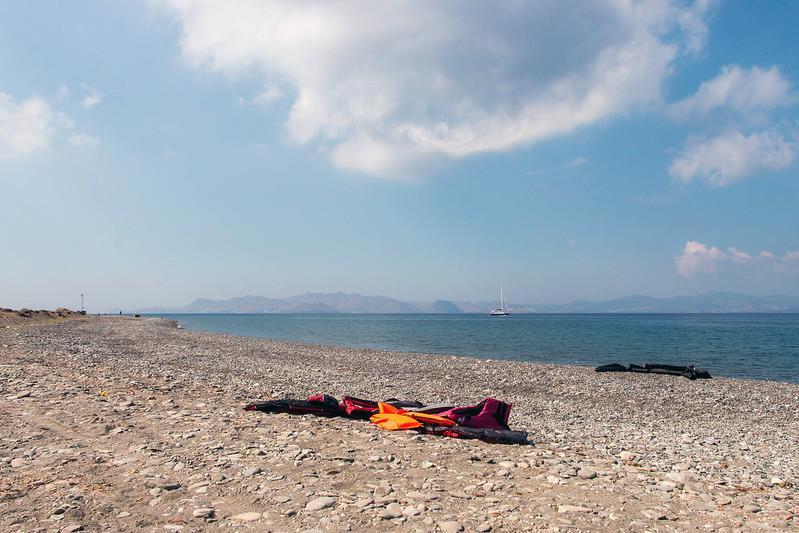

AS A new asylum seeker, I arrived in January, and found myself staying at the Holiday Inn, Heathrow, just a few minutes’ drive from the airport.
Eager to connect with fellow asylum seekers from different countries, I quickly realised that effective communication requires sensitivity in embracing diverse cultures, upbringings, religions, and perspectives. The next morning, a friendly Sudanese man approached me. He was humble, easy to talk to, and showed great compassion and support. He shared some valuable information with me about a nearby charity called Bell Farm Christian Centre.
This organisation provided various services to asylum seekers and refugees, including food, clothing, a free SIM card as well as advice, information, and care services. Intrigued by his recommendation, I decided to visit the charity on my sixth day after arrival.
Located in West Drayton, Middlesex, the charity centre was just a 15-minute walk from my hotel. The doors opened at 1pm, and I entered to find a warm and welcoming atmosphere. The volunteers were incredibly friendly and eager to listen and connect us with the relevant personnel for our specific needs, such as housing, ad-
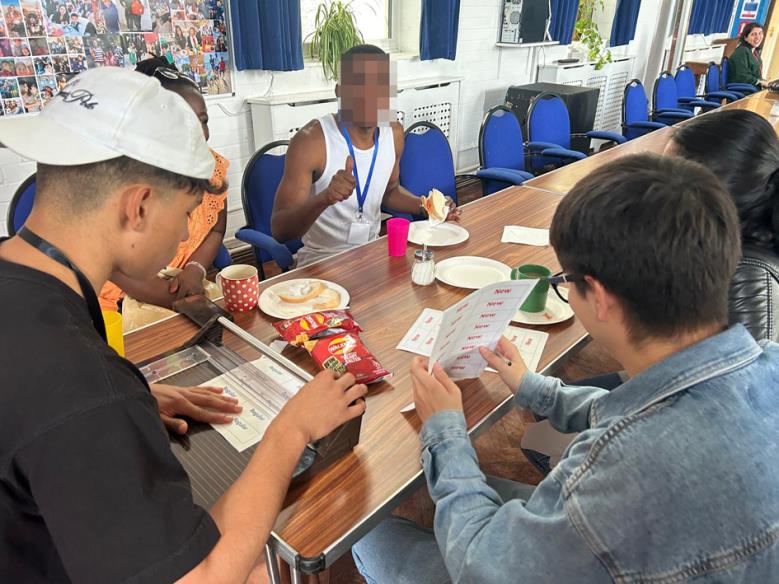
together in an orderly manner in a separate room. This thoughtful arrangement ensured that everyone in need could hopefully find some of the items they required. Throughout my first day at Bell Farm, I couldn’t help but be impressed by the leadership and the volunteers’ hospitality, humility and compassion. Inspired by their selfless service, I approached gracious David, a retiree who volunteered in the
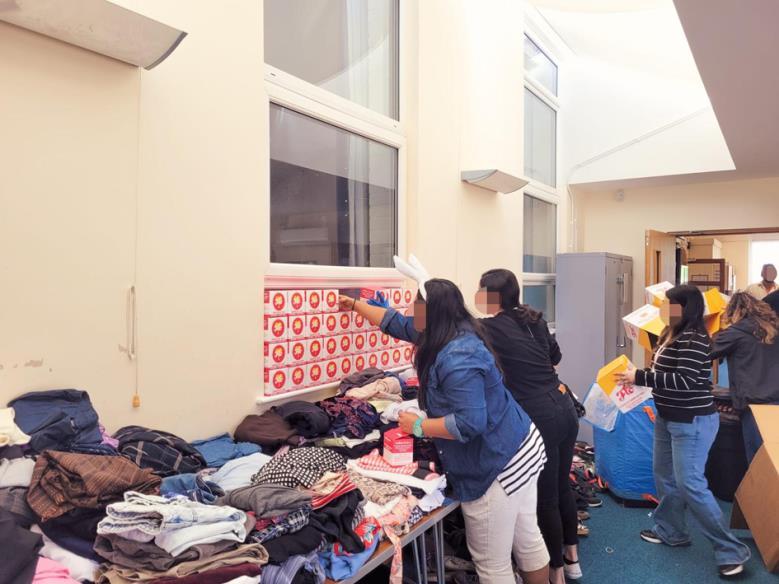
In conclusion, I want to shine a light on three remarkable individuals who are the backbone of the charity work at Bell Farm.
First, we have Donna, the one in charge of making sure everything runs smoothly at the centre. With her years of experience and wisdom, Donna is like a problem-solving guru. No matter what questions or challenges come her way, she always finds a way to provide solutions. Her energy seems limitless, and her compassion knows no bounds. Donna is always ready to lend an ear and offer a helping hand. Her passion for what she does shines through in every interaction.
Marianna, with her commanding voice and extensive knowledge, coordinates and directs the volunteers, ensuring that everything runs smoothly.
She goes above and beyond for every request for support needed by those in attendance, particularly for individuals facing housing challenges.
Lastly, there’s Destiny, a young and vibrant lady who may seem a bit shy at first, but her smile speaks volumes. When she greets you, her eyes light up with warmth and kindness.
Her welcoming presence is a source of comfort and reassurance for immigrants and refugees seeking assistance.
Tamirat
WHEN you read this article, we will have had the general election and Amnesty International will be working with a new government.
In our Human Rights Manifesto, Amnesty makes it clear that we require our government to create an effective, humane and civilised immigration system that:
provides safe, legal routes to the UK so that people can avoid having to make dangerous journeys and having to rely on people smugglers
processes asylum applications efficiently and take positive steps to reduce the backlog of asylum claims
judges applications on merit, not by how people arrive here
embodies a humane approach to family reunion
permits asylum seekers to work in order to support themselves
upholds this country’s obligations under international law
Amnesty International will continue to campaign and lobby law-makers to stand up for the rights of refugees and asylum seekers.
Amnesty International is a global movement of more than 10 million people who campaign for a world where human rights are enjoyed by all. It is the largest grassroots human rights organisation in the world, which means we are completely independent, funded and led by our membership.
To find out more about the work of Amnesty International and its local branches where you live see: https:// www.amnesty.org.uk/ Helen Ball
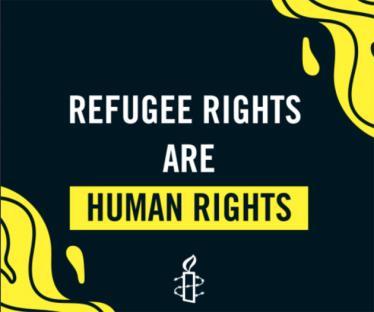
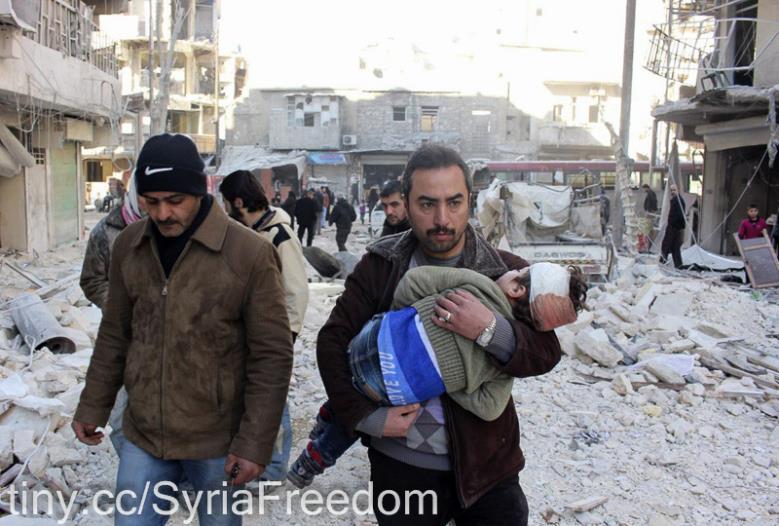
YARA fled her home in Aleppo, Syria, as a young woman of 18 years. The last thing she saw before she left was the road full of corpses. Crossing over the border felt like a betrayal to her family, who were still left struggling among the fighting, slaughter and destruction around them.
“I had left my friends and my family, but I was so scared I had to run and escape,” she said. “I worry about them, and I still pray and hope someone is caring about them.”
Yara managed to find her way to the UK. But this is not a story of escape. This is a story of a young woman’s determination to find a future and a new life.
Yara was waiting to start an undergraduate course studying archaeology when she was forced to flee Syria. Her dream was to continue to study and travel and work around the world. Her dreams came to an end in December 2014.
When asked why she wanted to tell her story, Yara’s reply was something not unfamiliar with refugees.
“Storytelling can provide a sense of home, belonging and connection in an
unfamiliar environment. I want to let people know where I am from and that I too have a family and friends. I haven’t heard from them in all these years.” She looks down and wipes her face.
Yara is now 28 years old and living in Newcastle. She found work two years after being given leave to remain, gaining refugee status.
Her part-time job as a retail assistant has given her time to study archaeology through distance learning with Newcastle University and she is determined to achieve her dream here in the UK. Stories like Yara’s are common among those escaping war and injustice.
The sense of commitment and undertaking must be seen to be believed and listening ardently to these stories is a humbling experience.
For information about Newcastle University’s distance learning courses see: www.ncl.ac.uk/study/distance-learning/ Other help is available from Refugee Education UK: www.reuk.org/home and Student Action for Refugees: https://starnetwork.org.uk/

KAIROS Housing is a charity, based in Blackburn, that offers supported accommodation to adult asylum seekers and refugees who are homeless and destitute.
They provide asylum seeker residents with No Recourse to Public Funds (NRPF) with free, safe and secure housing, a small weekly support payment and practical and emotional support from staff. Refugee residents with recourse to public funds pay rent for their housing and support.
Most refugees reach their host country meeting the diagnostic criteria for several psychological disorders. Trauma, anxiety and depression are often perceived as fabricated, and they are often expected to live on welfare provision that effectively marginalises them. They often feel dehumanised and unable to plan for the future, which leads to further traumatisation.
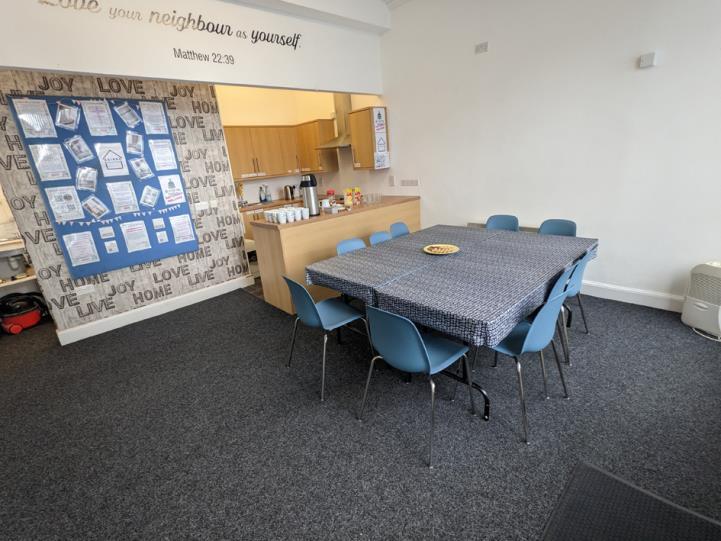
was going through a difficult time: “they were giving me a call every single night.” This is particularly important for refugees who live in an inhumane system, leading a precarious existence that is full of physical and psychological uncertainty. Kairos gives HOPE.
The living arrangements at Kairos help residents develop meaningful relationships with those living in all the flats, which has important psychological benefits.
Yusaf highlighted the value of talking to others, often in a similar situation, when he is stressed. He said: “If you speak with people, you don’t have stress and if I have something worrying me, I go to my neighbour. I say I want to talk.”
Refugees who have arrived in the UK bring with them significant skills, but the inability to work, because of the government policy process, denies them the opportunity to exercise this and can lead to a loss of identity and self-esteem. Their motivation, skills and potential are not realised and puts them in a position of social subordination.
Kairos and The Open University participated in a project to find out how Kairos Housing had helped residents. Twelve Kairos service users took part in the study: from Yemen, Iran, Iraq, Eritrea and Ivory Coast.
Overarching themes were identified, namely housing, language and integration, including Kairos general support and Kairos accommodation support. Housing was the main sub-
ject that residents talked about. They acknowledged the lack of available housing in the UK and were shocked that English people had problems finding homes in their own country.
Shervan shared that his worsened mental health problems had made him feel isolated and that the manager of his previous address had told him repeatedly ‘not to come back’. Mustafa was aware that sofa surfing could put him in a vulnerable situation. Ali expanded on the point of housing precarity: “If you don’t have a proper address, you have nothing. Housing is where you sleep. Housing is where you raise your family. Housing is everything.”
While residents did not talk about racism specifically, they shared that: “because I cannot speak English very well, some people get very impatient.”
Jam expressed that he sees learning English as going handin-hand with acquiring problemsolving skills to live in the com-
munity: “Learning English also includes showing you how to find the right English course.”
Residents discussed the link between language skills and successful integration. Together with housing and other life skills, it prevents difficulties further down the line.
This is something Kairos is doing very well, serving as a platform for residents to move on from.
Jam shared that he is keen to “show the route and the path and the correct way to asylum seekers and refugees…to integrate, share experiences. I am here to help people…when you have a map in front of you, you know where to go.”
Kairos supports practical help to its residents. They indicated that they feel recognised as ‘humans’ by the staff and that they experience love and respect that helps deepen the bond between residents and staff.
Ali expressed how when he
Residents were asked how they thought their lives would be without Kairos. Their responses were unanimously positive: “Without Kairos, I am homeless.”
It was clear that residents had high praise for Kairos, both in terms of general and accommodation-specific issues. The psychological benefits of residing at Kairos-supported accommodation included improved confidence speaking English, because residents practised speaking to each other, and had access to resources and interpreters in the form of other residents.
Challenges with sharing accommodation with new residents from other cultures emerged and there were opportunities to develop social problem-solving skills, despite language or cultural barriers.
A sense of belonging and pride demonstrated radical hope in the journey through the demands of the asylum-seeking process.
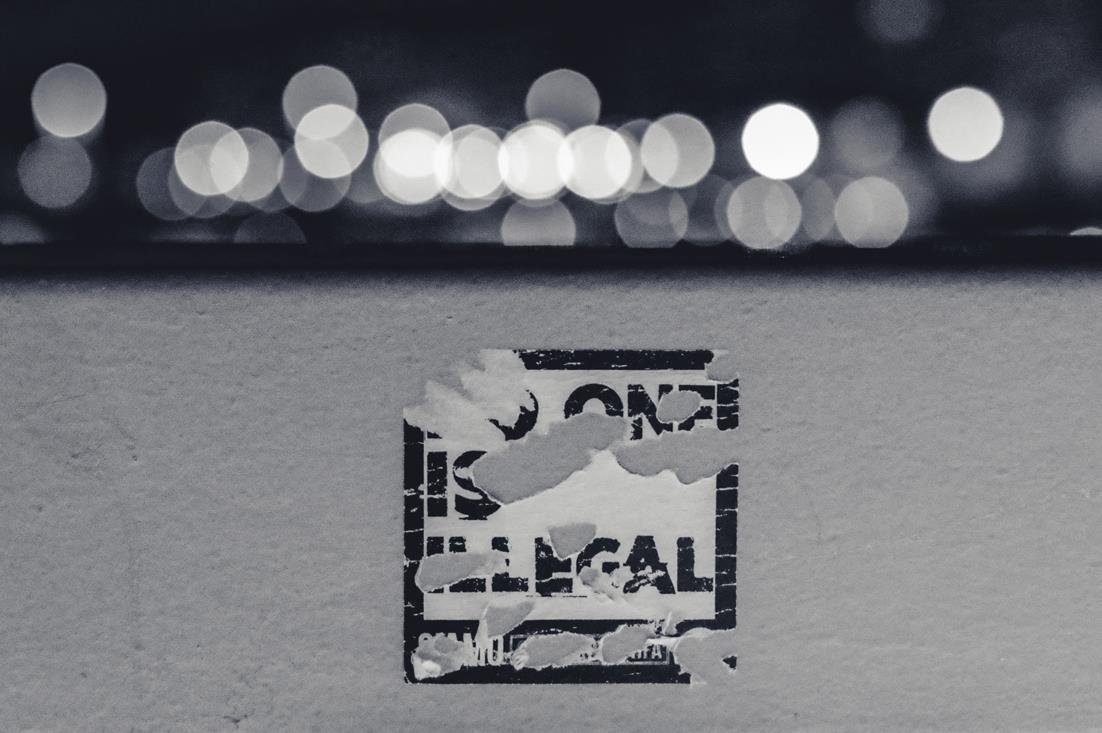
AN INVESTIGATION by the Guardian newspaper has uncovered that hundreds of complaints about ill treatment from staff looking after asylum seekers in hotels and other accommodation have been made to the Home Office.
Lodged within the last year, the complaints include abuse and harassment, failure to deal with vulnerabilities such as mental health problems and serious selfharm, and staff walking into asylum seekers’ bedrooms unannounced.
Freedom of information requests by the Guardian found 428 complaints about staff behaviour and treatment of asylum seekers.
Another 463 complaints were made about meals, including inedible food and a lack of milk for children.
The Guardian reports the incidents took place in what the Home Office calls ‘initial accommodation’ - such as hotelsrun by their contractors. To report a problem, asylum seekers must first contact the contractors and their complaints are forwarded to the Home Office.
One asylum seeker told the Guardian: “When we complain, our complaints get closed down. A male member of staff opened our bedroom door with a key when my daughter was in there. I can’t sleep at night knowing staff have the key to our bedroom.”
A second said: “They provide very little milk for my children and they have rules
restricting choices of the food that is served. They treat us like animals. Honestly, we suffer in this hotel.”
According to the Guardian report charities including Refugee Action and Care4Calais have also documented complaints from asylum seekers in hotels. In one case a doctor raised concerns about children being small for their ages and suffering from vitamin deficiency.
Tim Naor Hilton, the chief executive of Refugee Action, told the Guardian: “The number of issues reported to the Home Office by people living in asylum housing is just the tip of the iceberg.
“Problems often go unreported because people are worried that raising their voice will affect their asylum claim, or they will be disbelieved, denied or ignored. It’s vital that the next government tears up these rip-off contracts and properly funds councils to deliver housing and other services that can benefit their whole community.”
A report to Parliament said three hundred hotels were in use at the end of March, while the use of another 100 had been discontinued. It raised concerns about self-harm and suicide among asylum seekers in temporary accommodation and stated: “While the Home Office told us it incorporated safety measures into its contracts with providers, it could not provide any information about any penalties for falling below standards, despite reports of
significant safety failures on sites.” In response to the Guardian report the Home Office said it provided support for asylum seekers who would otherwise be destitute, despite the number of people arriving in the UK reaching record levels.
A spokesperson said: “The food provided in asylum hotels must meet NHS Eatwell standards and responds to all culture and dietary requirements.
“Where concerns are raised about any aspect of the service delivered in a hotel, we work with the provider to ensure these concerns are addressed and all complaints are dealt with seriously.”
The concerns come at a time when a businessman who won government contracts paying his company £3.5m a day for transporting and accommodating asylum seekers was named among the 350 richest people in the UK.
Graham King, whose businesses include Clearsprings Ready Homes, which won a 10-year Home Office contract for housing thousands of asylum seekers, appeared in the Sunday Times rich list of the wealthiest people.
The newspaper said King, 56, is estimated to have built up a £750m fortune from ‘holiday parks, inheritance and housing asylum seekers for the government’.
It reported Clearsprings Ready Homes made £62.5m in profits after tax for the year ending January 2023, more than double its profits of £28m the previous year.

JOSEPH is just 22, but everyone says he’s an old soul.
After only six months in our community, it’s difficult to imagine West London Welcome without him. He’s a star of the Advanced English classes and a key participant in book group.
He’s known for his cheerful and chatty disposition, his love of good food and his sense of humour. But he has been through more in his young life than most of us ever will.
Joseph came to this country from Uganda in 2018 following the death of both his parents. He was just 16, but mistakenly classed as an adult who could fend for himself. He lived alone in a hostel in West London. With the exception of his brother, he had no support and no one to talk to at all. Joseph had already lost the sight in one eye after getting caught up in political violence in his home country.
Then, after arriving in England, he got ophthalmia in his other eye. Eventually, he lost his sight entirely. For a long time, Joseph barely left his room. He was depressed and terrified of the strange, unfamiliar city outside his door.
Then, Joseph’s disability support worker at the local council told him about West London Welcome (WLW). Initially, Joseph struggled to get to the centre as he was afraid to take public transport alone. But he was soon connected with WLW volunteers who lived nearby, such as Sophie, who took him door to door every week and helped him learn to walk with a cane.
Joseph’s confidence steadily grew and he is now able to navigate London’s bus and tube system by himself. Through WLW, Joseph was connected
with the Prince’s Trust, going on various activities with them around the city.
Recently, he even tried rock -climbing. He loved it and can’t wait to do it again. Not even a rock face is off-limits to Joseph
founder and director, secured Joseph a new iPhone, opening up a whole world of audiobooks through Audible.
Community member Pari goes on regular walks with Joseph around his neighborhood.
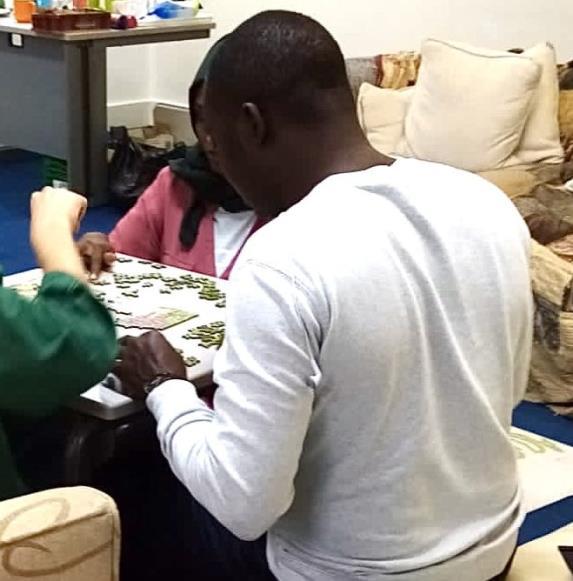
WLW that mean the most to him. It’s the “hi, how are you?” from other community members, the shared joke with a volunteer over lunch, even a simple offer of a cup of tea on a cold day.
Joseph isn’t just given food and left alone. Volunteers and other community member friends will help him to get exactly what he needs and tell him what he’s eating all the way through the meal. The other students in his English class read out the worksheets to him so he can participate in class discussion. Jo, the charity’s
for the lesson the week before, so he can listen via a text-tospeech app.
In WLW’s book group, community members will read out sections if needed. Joseph’s favourite book was Small Island by Andrea Levy, a story of four Jamaicans emigrating to London after World War II.
Joseph’s disability support worker recently visited him at the centre and said the difference in Joseph in just six months is nothing short of astonishing. On the first warm day of this year, Joseph went on a WLW group trip to Kew
Gardens. His phone rang. It was an excellent solicitor who wanted to take on Joseph’s case, thanks to the work of WLW Deputy Director Leyla, who had been trying to find him legal representation for months.
Joseph’s ordeal, however, is by no means over. Six years after his arrival in the UK, he still has unresolved immigration status.
He exists in limbo. Conscious of all the wasted years, he just wants to start his life.
Joseph is academically gifted and deserves to get a degree. But without securing his right to remain here, it is almost impossible for him to go to university. He dreams of becoming a lawyer who can help others and feel useful. But while he is seeking asylum, he’s not allowed to work.
Rick, Joseph’s English teacher, often brings in a poem for the end of class. He likes to use poetry to get a conversation going or introduce more complex vocabulary.
A few months ago, he read “When I Consider How My Light is Spent” by John Milton with the students: the poet’s meditation on going blind late in life.
The language moved Joseph greatly, as Rick hoped it would. In the poem, Milton describes his talent and spirit trapped inside him. He feels useless and scared in a “dark world and wide”.
This is how Joseph felt when he first came to the UK. Thanks to WLW, Joseph’s world isn’t dark and wide any longer. Through the charity, he has found a community and, in so doing, found himself.
For more stories from West London Welcome see: https:// www.westlondonwelcome.com/ josephs-story/

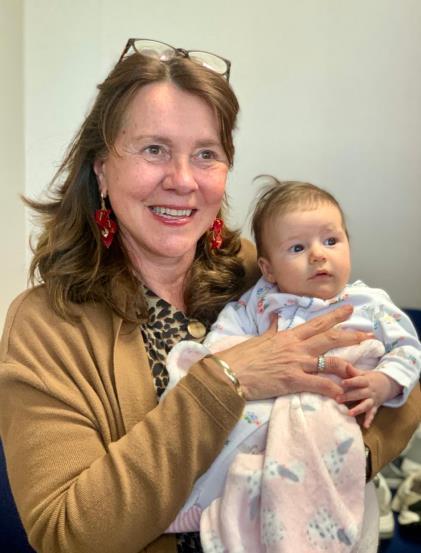
‘The
VOLUNTEERING for charitable causes is one of the noblest and most beautiful things you can do.
In today’s busy and chaotic world, dedicating time and resources to volunteer and do charity work requires a big heart and a strong will.
Debra, one of the volunteer members of the Care4Calais charity, has focused her efforts on refugees. Apart from her charitable activities and helping refugee women and families, she organises monthly gatherings for the refugees in Maidenhead, which are uniquely remarkable. Because of this, we conducted a short interview with her one spring afternoon.
Q: Please introduce yourself:
A: Hi, my name is Debra Jonckers. I was born in South Africa, however, my parents were born in the Netherlands, and left the Netherlands after WW2 as small children, as migrants they went to South Africa. My Dutch husband and I came to live in England at the end of the 1980s. So I come from a family that has moved and lives in different countries
Q: What services do you provide to asylum seekers?
A: I set up the free shop when the hotel was first opened, Hilda does a wonderful
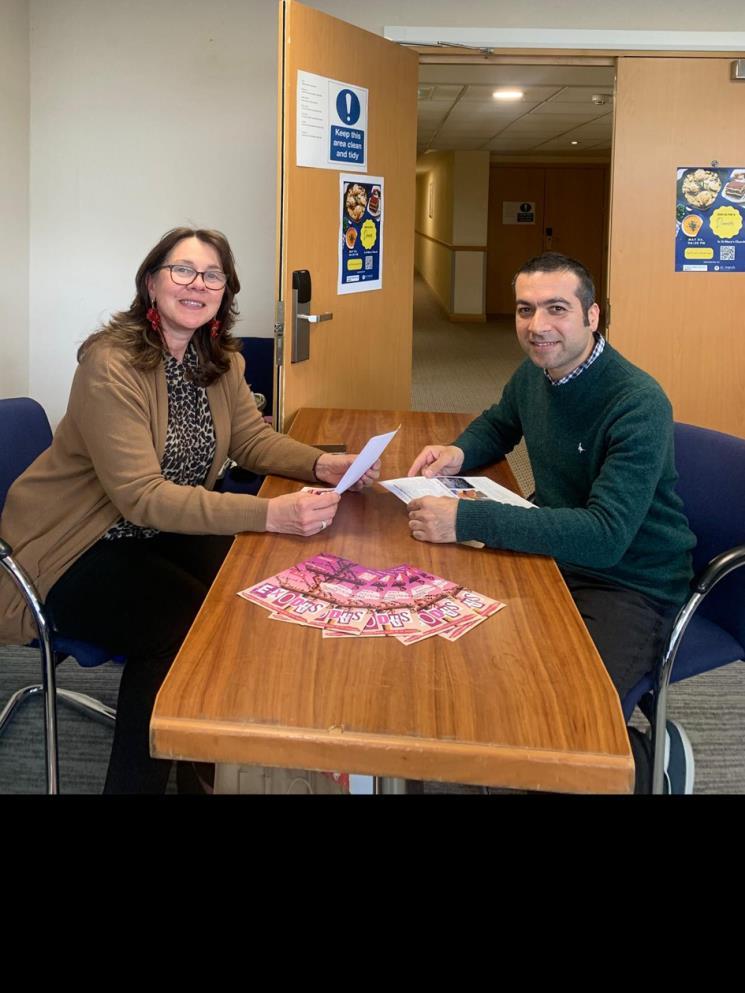
is to help others’
Q: In your opinion, what is the effect of giving and doing good work for the betterment of society?
job running the shop now and I help where I can, mainly finding ‘stock’ for the shop.
I also set up a dinner evening, where the asylum seekers can come and enjoy a lovely evening, relaxing, socialising and eating some good food cooked by other asylum seekers.
Q: Are there any problems and difficulties that may exist with this?
A: I think it is always challenging when you are mixing people from different countries and cultures: there is a language barrier, different expectations and food differences. My grandmother moved to South Africa from The Netherlands and she never learned to speak English, which meant she found it very difficult to speak to other South Africans. She always cooked Dutch food and for her it was difficult to find the ingredients for her meals. She was often very upset as she found South Africans were rude and acted in a way she didn’t understand, but was normal and acceptable in South Africa. The plus side was she only spoke Dutch to my brother and myself thereby we were raised with a free gift of a second language.
A: I feel we are all God’s children and therefore equal in his eyes. I believe everyone deserves respect, kindness and consideration. By giving of your time and investing effort in getting to know people from a different part of the world from you will only make yourself a better person and society will be a kinder, more considerate and more respectful place.
The lovely Taylor Swift says: ‘No matter what happens in life, be good to people. Being good to people is a wonderful legacy to leave behind’.
Q: Why did you decide to assist migrants?
A: I decided to assist with migrants because my family have been migrants and I feel I can understand the highs and lows.
Q: The last word...?
A: As Michael Jackson’s song says: ‘Heal the world, make it a better place, for you and for me and the entire human Race. There are people dying, if you care for the living, make a better place for you and for me’.
I think the only way to make this world better is to help others.

I RECENTLY had the opportunity to delve into the pages of an inspiring and eyeopening book called We Are Displaced: My Journey and Stories from Refugee Girls Around the World, written by Nobel Peace Prize winner Malala Yousafzai.
Published in 2019, in this remarkable memoir and collection of narratives, Malala not only shares her own personal journey of adjusting to a new life while longing for home but also sheds light on the stories of extraordinary girls she has encountered during her travels – girls who have lost their communities, loved ones, and the only world they have ever known.
We Are Displaced presents captivating accounts, particularly those of girls who face challenges and are denied the right to education due to cultural and claimed religious reasons.
The book showcases the stories of girls from various regions, including Latin America, South and Southeast Asia, the Middle East, and Central Africa.
Following in the footsteps of her father, Malala initiated her anonymous campaign for education at the tender age of 11, later becoming a vocal advocate for girls' education and garnering international media attention and accolades.
At 15, she survived an attack by the Taliban for fearlessly speaking out.
Malala recovered in the United Kingdom and continued her fight for girls' rights.
In 2013, she established the Malala Fund alongside her father, Ziauddin, and a year later, she received the Nobel Peace Prize in recognition of her tireless efforts to ensure that girls have access to 12 years of free, safe, and quality education.
Malala's trajectory and her courageous battle against the Taliban in Pakistan’s Swat Valley have been widely reported in major media outlets, making her a house-
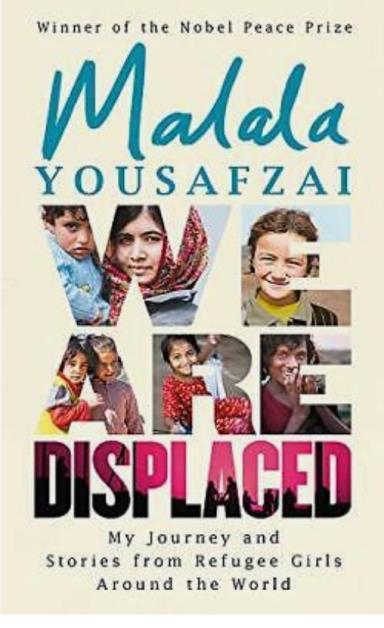
hold name. However, We Are Displaced goes beyond Malala's own story, giving voice to the experiences of other displaced girls who have been forced to leave their home countries due to the threat of persecution.
These girls not only recount their challenges but also reveal how they have overcome them in their refugee homes. Some have even initiated projects that defy the odds, both in their countries of origin and beyond, striving to enhance girls’ education, raise public awareness about its importance, and work tirelessly to effect positive change.
Malala's own project in her village serves as a shining example of this spirit, resonating across the globe.
Being forced to migrate or become a
refugee in another country does not mark the end of one’s journey. Instead, it should serve as a springboard to fight against the odds for fellow compatriots enduring similar hardships.
As recipients of safe havens in other countries, we must recognise the precious opportunities and chances we have been given and not take them for granted.
These opportunities should not only benefit us individually but should radiate outward, inspiring hope in others and creating safe environments for the underprivileged.
One of the invaluable lessons we can learn from the stories shared in We Are Displaced is that refugees can be highly productive when given the chance to thrive.
Rather than burdening host countries, refugees have the potential to support themselves, their immediate families, the host country, and even their communities of origin.
By channelling their efforts into productive endeavours, they contribute to the desirable changes that are needed in their communities, and their initiatives can be duplicated in other problem areas, ultimately fostering a peaceful and secure world for all.
We Are Displaced serves as a testament to the resilience, strength, and determination of displaced girls worldwide.
It reminds us that education is not only a fundamental right but also a powerful tool that can transform lives, societies, and the world at large.
Through their stories, these brave girls inspire us to take action, to stand up for justice, and to ensure that every girl, regardless of her circumstances, has the opportunity to fulfil her potential and make a lasting impact.
Tamirat Astatkie‘OUR HOME’ was the theme for Refugee Week 2024, which ran from June 17-23 and was marked by events across the UK. From the places we gather to share meals to our collective home, planet earth: everyone was invited to celebrate what our ‘Our Home’ meant to them.
Home can be a place of refuge, a feeling or a state of mind. It can be found in smells, tastes and sounds. From the

clothes we wear to the words we grew up with. It’s in food, music and arts. It’s in our cultures and in our landscapes. Home can be more than one place and finding it can be a journey, as it is for so
many of us who have to leave our countries and rebuild our lives. The aim of Refugee Week was to extended warmth and hospitality beyond our own homes and make entire neighbourhoods more welcoming. It saw communities practice solidarity and make Our Home a more welcoming, safe and sustainable place for all. Watch out for stories about activities from Refugee Week in the next issue of Exodus.

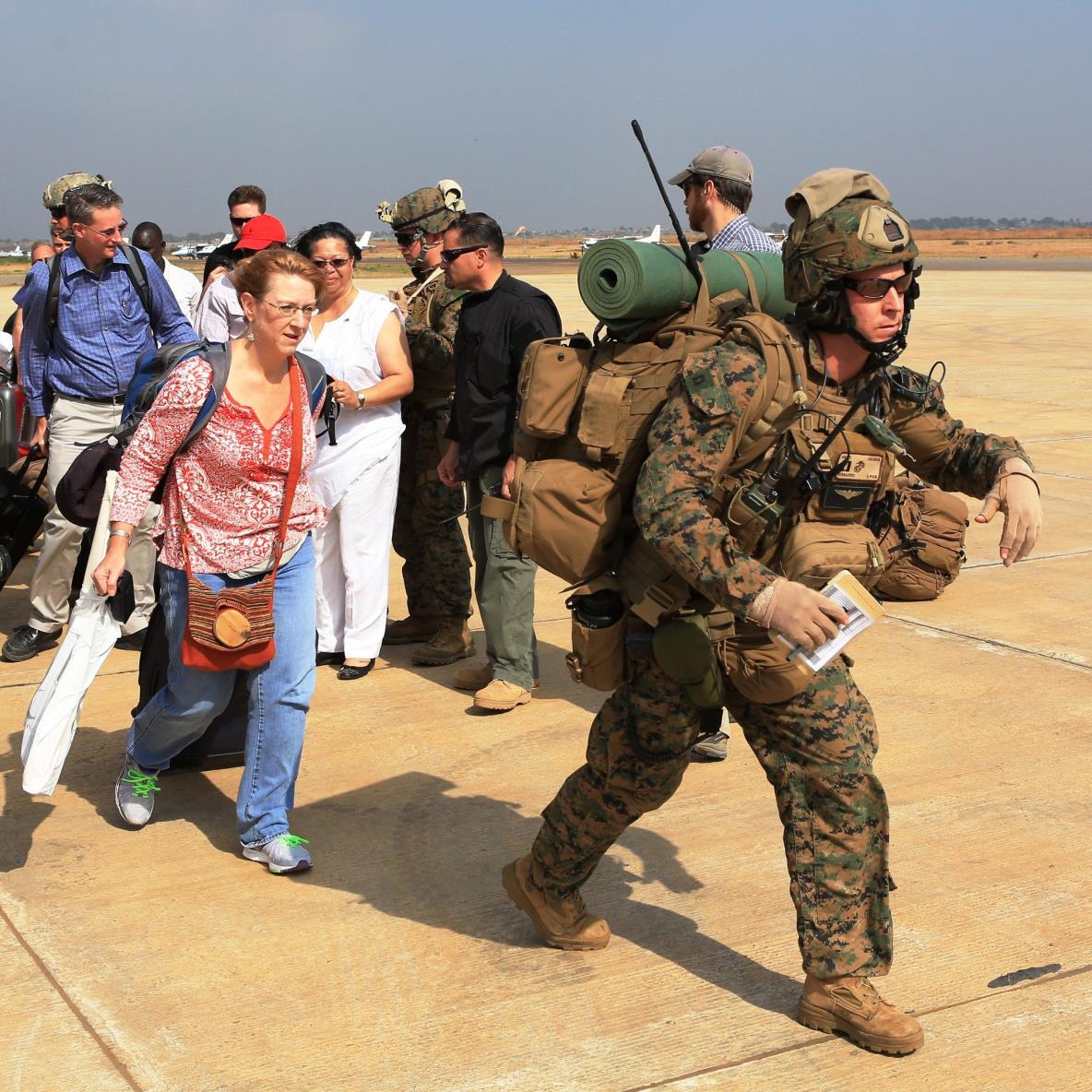
SINCE the start of the conflict in Sudan, large numbers of women, children, the elderly and other vulnerable groups have been displaced, with cross border movement into neighbouring countries leading to the need for humanitarian aid and protection. The conflict between Sudanese Armed Forces (SAF) and Rapid Support Forces (RSF) has created a humanitarian crisis in Sudan. Rape, including of children, and ethnic killings have been committed by both sides and thousands have been killed in motivated attacks in the Darfur region in the west of the country.
South Sudan hosts some 330,000 refugees and asylum seekers, (mainly from Sudan) making this the largest refugee crisis in Africa. The number of British people hoping to be evacuated could total 3,000-4,000-plus, and those on the ground
are living in fear with little food and water.
British nationals arriving in the UK from Sudan due to the violence will be exempt from residency tests, according to the GOV.UK website, and will have access to benefits and housing. As of March 2024, there were 5,000 Sudanese main applicants waiting for an initial decision on their asylum claim, 4,000 of whom had been waiting for more than six months. Humanitarian organisations have called on the Government to speed up processing and said the situation is ‘unacceptable’. There are many waiting to be reconciled with family left in danger and some waiting since 2022.
To speed up processing, critics say the Government should waive biometric requirements and extend the criteria beyond spouses and children under the age of 18.
Under existing rules, they must physically visit a visa centre in Sudan, many of which are not accessible due to the ongoing violence. The Refugee Council has accused the Government of driving Sudanese asylum seekers to resort to crossing the English Channel in small boats due to a lack of possible safe routes.
Quick, positive decisions on applicants should be made. A Home Office spokesperson said: “We want all asylum claims to be considered without unnecessary delay to reduce the cost to the taxpayer of expensive hotels.”
Instead of showing compassion and support, the Government is determined to lock up anyone who manages to get to the UK by boat, denying them progression to get a claim heard on UK soil.
Jean-Marc Hall
Thank you for supporting people seeking sanctuary

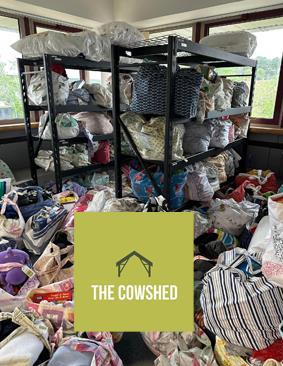

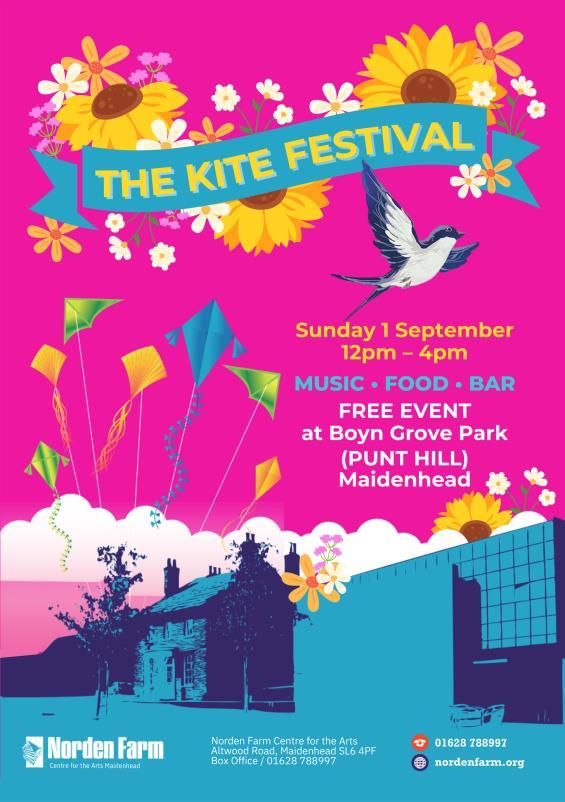

AFTER control of Imperial partitions by German and Belgium rule, Rwanda and Barundi formed a single, administrative territory, Ruanda-Urundi.
Germany and Belgium assumed that ethnicity could be clearly distinguished by physical characteristics and used these differences to create models, whereby the Hutu and Tutsi populations were no longer fluid.
This strengthened the minority Tutsi ruling class and in 1959 an organised political movement emerged that aimed to overthrow the monarchy and put power into the Hutu hands.
After World War II, colonial civil servants recognised that the Hutu were subjected to unequal treatment and support shifted from the Tutsi.
A revolution started with an uprising on November 1, 1959, resulting in a massive shift of power to the Hutu. In 1961, in the wake of a coup, Rwanda was declared a Republic, and an all-Hutu government came into being. Thousands of Tutsis began to flee Rwanda.
Yet another coup in 1973 by army officers overthrew the regime and installed Juvenal Habyarimana to power.
Tensions between Hutu and Tutsi flared in 1990 when rebels from the Tutsi Rwandan Patriotic Front (RPF) invaded from Uganda.
A ceasefire was negotiated in 1991 and an agreement signed that created a government that included the RPF. Hutu extremists opposed this plan and on April 6, 1994, Habyarimana and Burundi President Cyprien Ntaryamira were killed after their plane was shot down.
Hutu extremists were said to be responsible. The next day, Prime minister Agathe Uwilingiyimana was assassinated.
Over the next several months, the wave of anarchy and mass killings continued and during the genocide, more than 800,000 civilians, primarily Tutsi’s, were killed.
In 1995, The International Criminal Tribunal for Rwanda (ICTR), established by the United Nations Security Council, began to try its first cases of thousands of (mostly Hutu) prisoners who had committed acts of genocide in 1994. The tremendous number of people waiting to be tried led to a
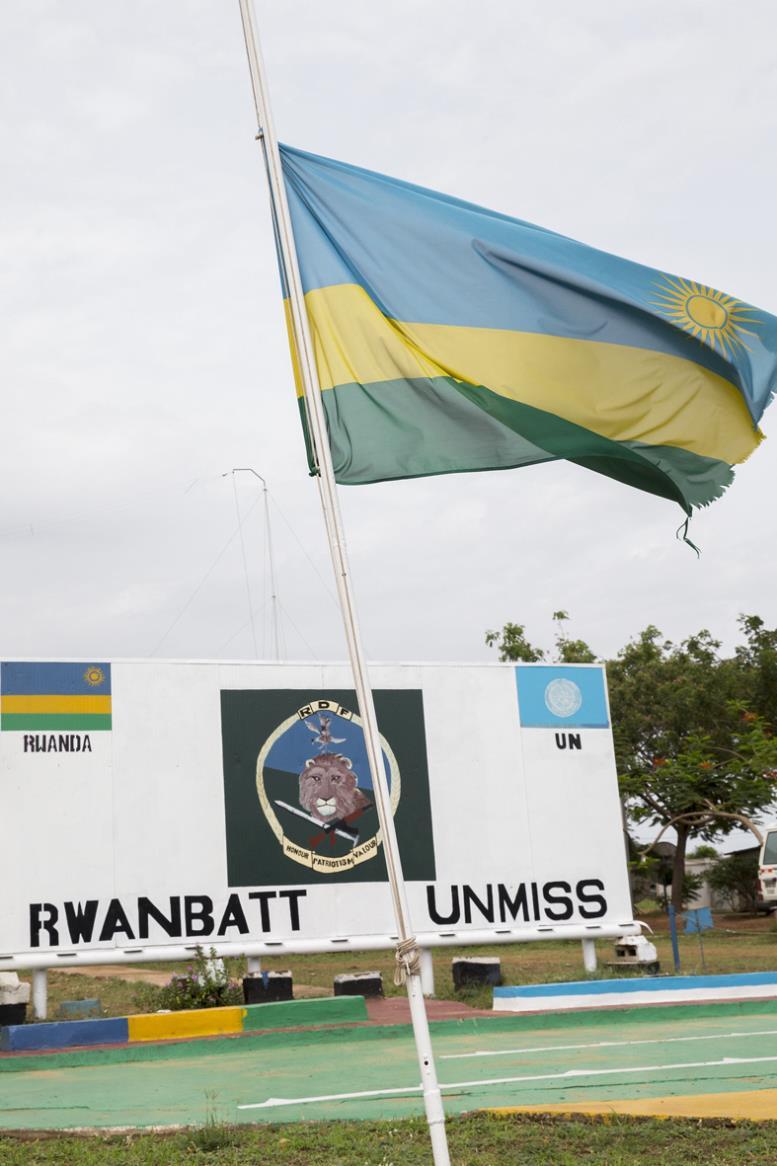
A commemoration of the anniversary of the Rwanda Genocide. Photo: United Nations, licensed under CC BY-NC-ND 2.0.
mass amnesty of prisoners accused of ‘lesser crimes’ and the ICTR formally closed in December 2015.
The Rwandan Patriotic Front (RPF), now the ruling party in the country, continues to stifle dissenting and critical voices and to target perceived threats to the government.
Arbitrary detention, ill-treatment, torture, and unfair trials all allegedly occur.
open speech obstructed. Freedom of expression is not tolerated.
Amnesty International reported that over 3,500 activists, journalists and politicians were potential targets of Rwandan authorities.
The question remains: Is Rwanda a safe country to send asylum seekers?
Jean-Marc Hall

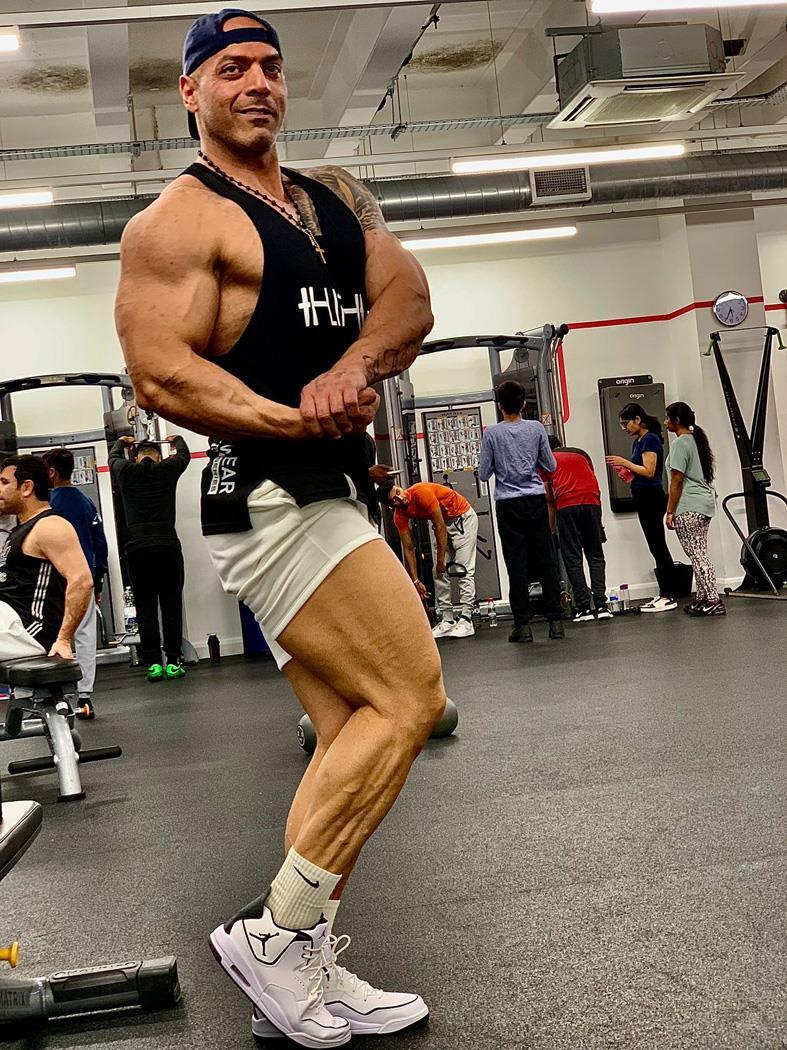
titles.
Bodybuilders focus on muscle conditioning and enhancing their physique. They showcase their defined muscles, symmetry and overall aesthetics through a series of poses judged by a panel.
These judges assess criteria such as mus-
ty in Iran put his life in danger, but his hopes are that he can bring pride to the UK, a free and safe country, and reach his full potential. He is aiming to register for the British championships in September and Exodus wishes him the best of luck.
Jean-Marc Hallgold medal-winning cyclist seeking asylum in the UK says his career is under threat after being told by the Home Office he is being moved to Bibby Stockholm barge.
Mohammad Ganjkhanlou, 26, who has won four gold, two silver and six bronze medals in top competitions, will not be able to take his bike on the barge.
Described by Michael Gray, Cycling Club, where he is a member, as the best racer in the history of under 23 cycling in Asia, Mohammad applied for asylum in the UK after competing in the World Championships in Glasgow because he felt his home country
Mohammed told the Guardian newspaper that since placed him in a hotel in Reading last year he had been given new hope for his career, thanks to the support network that he had built in the area. Home Office officials told the paper that while he would not be allowed to take his bike on board or ride it in the port area, Mohammad would be allowed to up at the port and ride it elsewhere.
“The Reading cycling club are like family to me. Because I am an asylum seeker I have to work my way back through the elite cycling system from the beginning and the club is helping me with this,” Mohammed told
“If the Home Office transfers me to Bibby Stockholm I will be in prison, away from the cycling that is my life and my therapy.”
Emma Clark Lam, a volunteer at Care4Calais in Reading who is supporting Mohammed, said: “I do believe his mental health would be gravely at risk if he were sent to live on the Bibby Stockholm barge. We’re still hoping the Home Office will change their mind on this, but if they don’t, it would be a very cruel outcome for poor Mohammad.”